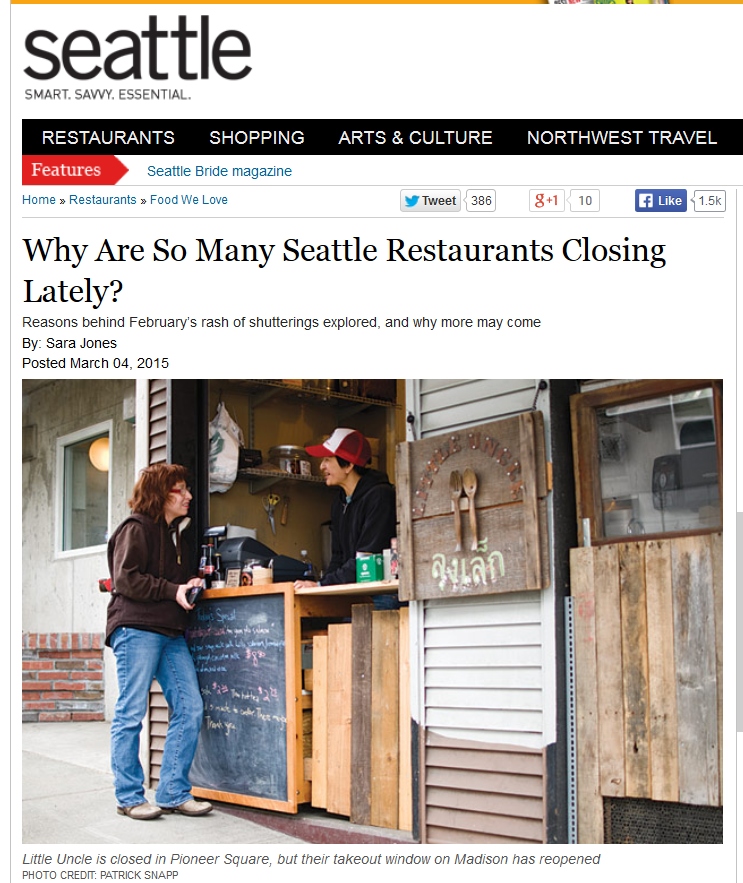First story explains why minimum wage destroys more jobs and businesses then it ever creates.
Second story shows the negative outcomes from new minimum wage laws.
Second story shows the negative outcomes from new minimum wage laws.
It is fascinating to see brilliant people belatedly discover the obvious — and to see an even larger number of brilliant people never discover the obvious.
A recent story in a San Francisco newspaper says that some restaurants and grocery stores in Oakland’s Chinatown have closed after the city’s minimum wage was raised. Other small businesses there are not sure they are going to survive, since many depend on a thin profit margin and a high volume of sales.
At an angry meeting between local small business owners and city officials, the local organization that had campaigned for the higher minimum wage was absent. They were probably some place congratulating themselves on having passed a humane “living wage” law. The group most affected was also absent — inexperienced and unskilled young people, who need a job to get some experience, even more than they need the money.
It is not a breakthrough on the frontiers of knowledge that minimum wage laws reduce employment opportunities for the young and the unskilled of any age. It has been happening around the world, for generation after generation, and in the most diverse countries.
It is not just the young who are affected when minimum wage rates are set according to the fashionable notions of third parties, with little or no regard for whether everyone is productive enough to be worth paying the minimum wage they set.
You can check this out for yourself. Go to your local public library and pick up a copy of the distinguished British magazine “The Economist.”
Whether it is the current issue or a back issue doesn’t matter. Spain, Greece and South Africa will be easy to locate in the table near the back, which lists data for various countries. Just look down the unemployment column for countries with unemployment rates around 25 percent. Spain, Greece and South Africa are always there, whether or not there is a recession. Why? Because they have very generous minimum wage laws.
While you are there, you can look up the unemployment rate for Switzerland, which has no minimum wage law at all. Over the years, I have never seen the unemployment rate in Switzerland reach as high as 4 percent. Back in 2003, “The Economist” magazine reported: “Switzerland’s unemployment neared a five-year high of 3.9% in February.”
READ THE REST HERE
http://capitalismmagazine.com/2015/03/ruinous-compassion/
Seattle’s $15 minimum wage law goes into effect on April 1, 2015. As that date approaches, restaurants across the city are making the financial decision to close shop. The Washington Policy Center writes that “closings have occurred across the city, from Grub in the upscale Queen Anne Hill neighborhood, to Little Uncle in gritty Pioneer Square, to the Boat Street Cafe on Western Avenue near the waterfront.”
Of course, restaurants close for a variety of reasons. But, according to Seattle Magazine, the “impending minimum wage hike to $15 per hour” is playing a “major factor.” That’s not surprising, considering “about 36% of restaurant earnings go to paying labor costs.” Seattle Magazine,
“Washington Restaurant Association’s Anthony Anton puts it this way: “It’s not a political problem; it’s a math problem.”
“He estimates that a common budget breakdown among sustaining Seattle restaurants so far has been the following: 36 percent of funds are devoted to labor, 30 percent to food costs and 30 percent go to everything else (all other operational costs). The remaining 4 percent has been the profit margin, and as a result, in a $700,000 restaurant, he estimates that the average restauranteur in Seattle has been making $28,000 a year.
“With the minimum wage spike, however, he says that if restaurant owners made no changes, the labor cost in quick service restaurants would rise to 42 percent and in full service restaurants to 47 percent.”
READ THE REST HERE
https://shiftwa.org/more-seattle-restaurants-close-doors-as-15-minimum-wage-approaches/




 Free_Will @djross95
Free_Will @djross95